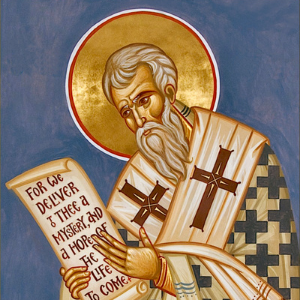 A Reflection for the Thursday of the Fourth Week of Lent
A Reflection for the Thursday of the Fourth Week of Lent
This semester, Fr. Ryan is delivering six lectures—each featuring a specific saint in our Church—every other Thursday night to undergraduates of STM. So far, we have devoted our studies to St. Thomas More, St. Teresa of Calcutta and St. Joseph. In the undergraduate men’s spirituality group, we are participating in a consecration to St. Joseph, to whom Pope Francis has dedicated the year 2021. With all the learning about saints going on this semester, I wanted to write my Lenten reflection about the saint whose feast day is today: St. Cyril of Jerusalem.
St. Cyril was a catechist. He was raised in Jerusalem in the early 300s and was ordained that city’s bishop. He was tasked with catechizing the newly baptized and those preparing for Baptism during Lent and Easter. Two years ago, around this time, I myself was studying catechesis—at STM with Sr. Jenn—to prepare for my next step in faith: confirmation. While I did not read Saint Cyril’s Catecheses in preparation for my confirmation, it is cool to think that I underwent the catechism process that St. Cyril pioneered eighteen centuries ago.
Half of St. Cyril’s episcopate was spent in exile. Caught in the Arian controversy, St. Cyril was not allowed to share the word of God in Jerusalem, the city he loved most. One year ago, around this time, we were all more or less “exiled” from Yale’s campus when the pandemic struck. We could not study at a physical library, share meals with each other in our dining halls or receive the Eucharist at STM as we had used to. Exile was difficult, as it must have been for St. Cyril of Jerusalem. However, upon his return, St. Cyril went to the Council of Constantinople in 381. At the Council, the amended form of the Nicene Creed we recite every Mass was promulgated. St. Cyril came to accept the word consubstantial—Christ is of the same substance or nature as the Father.
This Lent, whether or not we can physically receive the Eucharist, we can always think about Christ’s relationship to the Father. As an early theologian, this was a big question on St. Cyril’s mind. Christ, consubstantial with the Father, came to us out of God’s love, as today’s verse before the gospel reminds us: “God so loved the world that he gave his only-begotten Son, so that everyone who believes in him might have eternal life.”
St. Cyril of Jerusalem, Doctor of the Church, pray for us.



